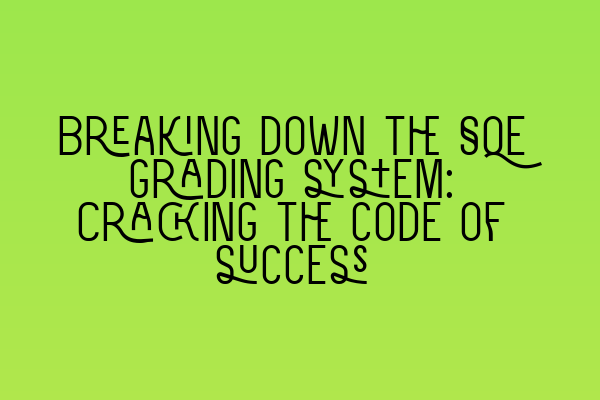Breaking down the SQE Grading System: Cracking the Code of Success
If you’re on the path to becoming a qualified solicitor, you’ve probably heard about the Solicitors Qualifying Exam (SQE). This groundbreaking new assessment is designed to streamline and standardize the qualification process for solicitors in England and Wales. And, if you’re aiming for success in the SQE, understanding the grading system is essential. In this blog post, we will break down the SQE grading system and provide you with invaluable insights to help you crack the code of success.
Before we dive deep into the grading system, let’s take a moment to discuss why it’s important. The SQE grading system not only determines whether you pass or fail, but it also provides a comprehensive assessment of your competence as a solicitor. By understanding how the grading system works, you can strategically plan your study and revision, ensuring that you excel in every aspect of the exam.
The SQE grading system is divided into two parts: SQE1 and SQE2. SQE1 focuses on assessing your knowledge and understanding of the law, while SQE2 evaluates your practical legal skills. Each part consists of multiple assessments, and each assessment is further divided into different types of questions.
In SQE1, the assessments are categorized into two levels: Functioning Legal Knowledge (FLK) and Legal Principles and Rules (LPR). The FLK assessments test your ability to apply legal principles to real-life scenarios, while the LPR assessments assess your understanding of legal theories and concepts. It’s important to note that both levels are equally important, and you should strive for excellence in both to secure a high overall score.
Now, let’s explore the grading scale for SQE1. The grading scale ranges from A+ to E, with A+ being the highest grade and E indicating a fail. Achieving an A+ demonstrates exceptional understanding and application of legal knowledge, while a fail may suggest areas where you need to focus your revision efforts. It’s crucial to aim for a high grade in all assessments to maximize your chances of success in the SQE.
Moving on to SQE2, the assessments focus on testing your practical legal skills. These skills include drafting, advocacy, client interviewing, legal research, and case analysis. Similar to SQE1, SQE2 also employs a grading scale ranging from A+ to E, with A+ indicating outstanding practical skills and E representing a fail. By practicing and honing your practical skills, you can enhance your performance in SQE2 and aim for top grades.
Now that we’ve discussed the basics of the SQE grading system, it’s time to talk about strategies for success. Here are some valuable tips to help you crack the code of success:
1. Comprehensive Preparation: Start your preparations early and cover all the required areas of knowledge and practical skills. Don’t leave any stone unturned and utilize a reliable study material to ensure thorough understanding.
2. Mock Tests: Practice makes perfect! Take advantage of interactive SQE mock tests for property, commercial, and other key areas. These mock tests provide a realistic exam experience and help you identify areas where you may need improvement.
3. Law Articles: Gain valuable insights by reading related articles on legal considerations in residential leases, lease laws, understanding planning permission, and more. These articles will not only enhance your understanding but also provide valuable context for applying legal principles.
4. Time Management: Develop a study schedule that allows for focused revision of every aspect of the exam. Effective time management is crucial to cover all the required material and ensure sufficient practice before the exam.
5. Seek Professional Guidance: If you feel overwhelmed or need additional support, don’t hesitate to seek guidance from qualified professionals or join a dedicated SQE training program. They can provide personalized advice and assistance tailored to your specific needs.
In conclusion, cracking the code of success in the SQE requires a deep understanding of the grading system, comprehensive preparation, and strategic study techniques. By following these tips and utilizing relevant study materials, mock tests, and resources, you can maximize your chances of achieving outstanding results in the SQE. So, set your sights high, put in the hard work, and watch as you unlock your potential as a successful solicitor.
Related Articles:
– Legal Considerations in Residential Leases: Essential Insights for Solicitors
– Lease Laws in the UK: Unraveling the Legal Framework for Tenants
– Interactive SQE Mock Tests for Property: Enhance Your Exam Performance
– Freehold vs Leasehold: Understanding the Differences
– Understanding Planning Permission and Land Use: Key Considerations for Legal Professionals

Leave a Reply